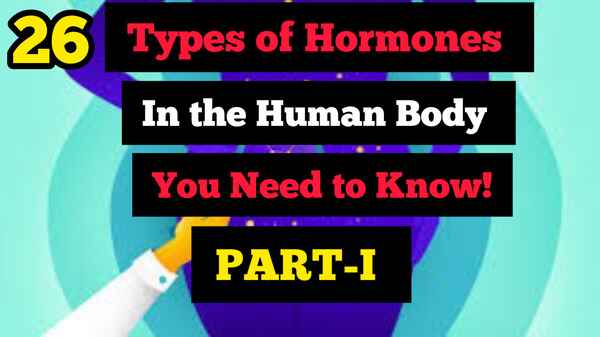Who is responsible for making you fall in love? Your hormones of course! The human body works like a fantastic orchestra, and at the center of this musical performance are these hormones – tiny chemical conductors of bodily processes. These small but powerful messengers play a key role in maintaining our health. They manage stress, regulate growth, and influence emotions and sleep patterns, each with a unique function.
So let’s delve into the wonderful world of hormones and discover their extraordinary roles!
1. Cortisol – The Stress Destroyer:
Cortisol, known as the stress hormone, is produced by the adrenal glands, which are located on top of the kidneys. Its primary role is to manage stress responses and help the body cope with various challenges.
During stressful situations, cortisol increases the level of glucose in the bloodstream, providing a quick source of energy. It also regulates metabolism, blood pressure, and immune function. However, long-term high levels of cortisol due to chronic stress can have negative effects on the body, leading to health problems such as weight gain, a weakened immune system, and high blood pressure. Source
Also, Read Complete Guide on Cortisol Hormone: Meaning, Function, Role, and Tips to Regulate
2. Insulin – guardian of glucose:
Insulin is a hormone produced by beta cells in the pancreas. Its main function is to regulate blood glucose levels in the body. When we consume food, especially carbohydrates, the pancreas releases insulin into the bloodstream. Insulin then allows cells in the body to absorb glucose from the bloodstream, provide energy to the cells, or store excess glucose as glycogen in the liver and muscles. By maintaining optimal blood sugar levels, insulin ensures that the body’s cells receive the energy they need to function properly. Source

3. Testosterone – the male:
Testosterone is a sex hormone that plays a key role in male development and reproductive function. It is primarily produced in the testes in men and in smaller amounts in the ovaries in women. Testosterone is responsible for the development of male sexual characteristics, such as a deepening of the voice, growth of facial hair, and an increase in muscle mass. In addition to its role in reproduction, testosterone also contributes to mood regulation, maintaining bone density and muscle strength.
4. Growth Hormone:
Growth hormone, also known as somatotropin, is produced in the pituitary gland, a small gland located at the base of the brain. As its name suggests, growth hormone is responsible for stimulating growth and cell reproduction throughout the body. It plays a vital role in childhood and adolescence, supporting the growth and development of bones, muscles, and other tissues. In addition, growth hormone continues to have essential functions in adults, supporting tissue repair, metabolism, and overall physical well-being.
Also Read: Complete Guide on Growth Hormone: Meaning, Function, Role, and Tips to Regulate
5. Adrenaline – fearless rhythm:
Adrenaline, also called epinephrine, is a hormone and neurotransmitter produced in the adrenal glands, especially the medulla. Adrenaline is released in response to stress or danger and activates the body’s “fight or flight” response. It increases the heart rate, expands the airways, and mobilizes energy reserves, preparing the body to respond quickly to potential threats. The rapid effects of adrenaline help us react with strength and speed when faced with challenging or life-threatening situations.

6. ACTH – The Stress Signal Master:
Adrenocorticotropic hormone (ACTH) is produced and released by the pituitary gland. It plays a key role in the body’s stress response system. ACTH travels to the adrenal glands, specifically the adrenal cortex, where it stimulates the production and release of cortisol.
Cortisol, in turn, helps the body respond to stress by increasing glucose availability, suppressing nonessential functions, and enhancing immune responses. ACTH ensures that the body’s stress response is fine-tuned and ready to cope with different levels of stress. Source
7. Parathyroid hormone – The calcium wizard:
PTH is secreted by the parathyroid glands, which are tiny glands located near the thyroid gland in the neck. The primary role of it is to regulate blood calcium and phosphate levels. When blood calcium levels fall, PTH is released, which stimulates the release of calcium from the bones and increases its reabsorption in the kidneys, thereby increasing blood calcium levels. It also acts on the intestines to increase the absorption of calcium from food. By maintaining calcium homeostasis and ensuring proper nerve function, muscle contraction, and bone health. Source
8. Oxytocin – The Bond Enhancer:
Oxytocin, often referred to as the “love hormone” or the “bonding hormone,” is produced in the hypothalamus and released by the pituitary gland. It is associated with social bonds, emotional attachment, and maternal behavior.
During labor, oxytocin plays a vital role in inducing contractions and facilitating labor. In addition, it supports the bond between mothers and infants during breastfeeding. Oxytocin is also involved in strengthening social bonds, trust, and feelings of empathy, creating a deep sense of bond between individuals. Source
9. Estrogen – female euphoria:
Estrogen is a group of hormones primarily produced in the ovaries, with smaller amounts produced in the male testicles and other tissues. Estrogen is particularly important in females and plays a vital role in the development and regulation of the female reproductive organs and secondary sexual characteristics. It controls breast development, regulates the menstrual cycle, and prepares the body for pregnancy. Estrogen also affects bone density, skin health, and overall feminity.
10. Thyroid Hormones – The Energy Orchestrators:
The thyroid gland, located in the neck, produces two key hormones: thyroxine (T4) and triiodothyronine (T3). These hormones help regulate the body’s metabolism and determine how efficiently it uses energy from the food we eat. They affect various processes such as body temperature, heart rate, and digestion. Thyroid hormones play a key role in growth, development, and maintaining overall energy balance. Source
Also, Read Thyroid Cancer: Symptoms, Causes, Risk Factors, Diagnosis, Prevention, Facts
11. Prolactin – The Milk Hormone:
Prolactin, released from the pituitary gland, is often referred to as the “milk hormone”. Its main function is to stimulate and maintain milk production in the mammary glands after childbirth. When the baby sucks at the breast, the stimulation signals the release of prolactin, which ensures a constant supply of nourishing milk for the infant’s needs. Prolactin plays a vital role in nurturing and nurturing the bond between mother and baby during breastfeeding.
12. Progesterone – The Nurturing Guardian:
Progesterone is a hormone produced primarily in the ovaries and is necessary to support pregnancy. Its key role is to prepare and maintain the endometrium to create a suitable environment for the implantation and growth of the fertilized egg. During pregnancy, progesterone helps prevent premature contraction of the uterine muscles and protects the developing fetus. It continues to play a vital role in supporting pregnancy until delivery, after which levels drop, leading to the onset of the menstrual cycle.
13. Aldosterone – The Fluid Symphony:
Aldosterone is a hormone synthesized in the adrenal cortex. It plays a vital role in maintaining the balance of fluids and electrolytes in the body. When sodium levels in the body are low or potassium levels are high, aldosterone is released, which retains sodium and excretes potassium, helping to regulate blood pressure and fluid levels. By adjusting these electrolyte levels, aldosterone ensures that the body remains properly hydrated and stable.
Want to learn more? Read our Part 2 of Types of Hormones in the Human Body You Need to Know!





